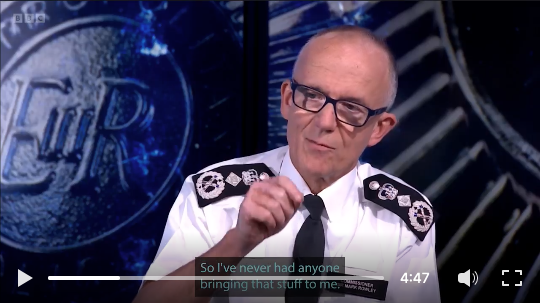Sir Mark Rowley, Metropolitan Police Commissioner gave a masterclass in Failureship on Newsnight. This is a link to the interview that Sir Mark Rowley shared himself on LinkedIn.

Sir Mark Rowley’s response to a whistleblower calling out horrific behaviour is:
I’m currently building and launching a massive new team, an Anti-Corruption and Abuse Command
No commitment to the results, only a commitment to action. Classic failureship response to focus on a solution rather than a deeper understanding of the problem. We all know that a team will be set up and will waste millions of tax payers money with the end result of “None of our fellow officers are a problem.” or perhaps “We found a few token rotten apples, mainly the ones that management already knew about”. You could lift the script from the movie “LA Confidential”.
However, the really telling statements relate to the culture of transparency. In a failure culture, the leadership do not want transparency. They actively discourage it. Repeatedly, the police officers are taught that “Snitches get Stitches”. In a work environment where collaboration and cooperation are vital for personally safety and security, getting a reputation as a snitch result in someone failing to watch your back at the exact moment you need them to.
On transparency, Sir Mark Rowley said:
As a Senior Officer, you have to be realistic that it’s not going to be shared with you.
I’ve never had anyone bringing that stuff to me.
Sir Mark Rowley should have said:
I am horrified that this was going on and I did not know about it. Clearly good police officers knew about it but did not feel compelled or feel safe to share it with me. I need to make it easier for good police officers to discuss difficult issues like this with senior police officers so that we can act to root out this corruption.
Some suggestions for Sir Mark Rowley which don’t cost much at all:
- The excuse that a senior officer is unaware of bad behaviour should be seen as a failure of leadership. They need to mentoring and coaching to help them learn how to make sure they do know when there is a problem rather than suppress the transparency.
- Fundamentally you need to reduce the power distance index. New recruits should feel as comfortable speaking to senior police officers as they do speaking to each other. If a new recruit needs to speak to the Metropolitan Police Commissioner, it should be clear what they need to do to speak to them with minutes or hours. Each police officer should be assigned two senior mentors in two different forces. Senior officers will need to build deep build relationships with all police officers. Its should be the responsibility of the Senior Officer to build relationships as its almost impossible for the Junior officers to reach out.
- For new recruits, the relationship starts at Police Officer Training. A senior officers could be assigned to spend an entire week with new recruits from all over the country so that they have time to get to know them.
- Get out of the police head quarters. It is a major barrier to communication. Senior police officers should operate out of police stations, avoiding the use of offices unless absolutely necessary. They should get their own coffee and mingle with the junior police officers. If a senior police officer randomly sits in normal desks for a few days, people stop noticing that they are there. They will then be able to observe the real culture, and understand the real risks.
- In the event that something unpleasant, … or something good, is bought to your attention, go the gemba. Go to the place of work and investigate yourself. Given that this behaviour bought down your predecessors, you should realise how important it for you to be present rather than simply sending in the Anti-Corruption and Abuse Command.
The interviewer asks:
Dave Eden, the whistleblower, said that you have been silent on these issues in the past. Do you dispute that?
Sir Mark Rowley responded:
I’ve never met Dave Eden and he’s got no knowledge about my career.
Sir Mark Rowley could not have made it clearer how much he disapproved of Dave Eden, and at the same time reinforcing the “Snitches get stitches” culture where the wrong doer are fine as long as they are not caught. There is no attempt to point to evidence that Sir Mark Rowley has indeed been outspoken about these issue. Pure failureship… attack and dismiss the messenger.
Instead, Sir Mark Rowley could have said:
Dave Eden is a hero. I am keen to meet him as soon as possible (hint: Go to the Gemba) so that I can better understand why the system has failed. We need more heroes like Dave. I want to better understand the changes we need to make it easier for people like Dave to come forward. To do that I need Dave to help me on this journey.
And I think Dave Eden is right. I have not been loud enough on these issues. If Dave is not aware of my position on these issues, then many others are also not aware of my position. I need to communicate better.
On behalf of the London Metropolitan Police I would like to thank Dave Eden for having the courage to push this issue into the public arena when our internal mechanisms have obviously failed.
Sir Mark Rowley demonstrates several of the Failureship Anti-Patterns in this interview. Hopefully he will reflect and address the failureship culture he is now responsible for. If not, as a resident of London I hold my breath waiting for the next incident when an officer in the Met Police fails us yet again.
Leave a comment